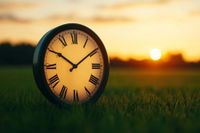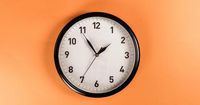This weekend marks a significant moment for France as the country transitions to daylight saving time. In the night from Saturday, March 29, to Sunday, March 30, 2025, at 2:00 AM, clocks will spring forward to 3:00 AM. This well-known time change, which many view as a minor inconvenience due to the loss of an hour of sleep, actually has real physiological effects on the body for some individuals.
According to Inserm, this change impacts our internal biological clock, known as the circadian system, and can induce adverse effects on our health. The adaptation to this time difference varies from person to person and can take anywhere from a few days to several months. Young children and the elderly are at a higher risk of experiencing negative effects, as are adolescents, night workers, and those suffering from sleep disorders.
For babies under 5 or 6 months, the impact remains moderate. However, once they pass this age, they become sensitive to the lost hour of sleep. Dr. Arnault Pfersdorff explains that after this age, children may experience decreased appetite, unusual agitation, and mood changes in the days following the time change.
Moreover, the consequences can be more serious than mere fatigue. A 2014 study by the University of Colorado revealed a 24% increase in heart attacks on the Monday following the switch to daylight saving time. A Finnish study also found that the rate of ischemic strokes was 8% higher during the two days following the time change. The National Institute for Sleep and Vigilance indicates that in the week following the switch to daylight saving time, there is an increase in car accidents, myocardial infarctions, and depressive states.
Despite these alarming statistics, some chronobiologists temper these conclusions, believing that the one-hour shift is insufficient to disrupt our biological rhythms significantly. They argue that the fatigue experienced is more closely related to our behaviors; with longer evenings, people tend to go to bed later while the wake-up time remains unchanged.
So how can one adapt smoothly to this time change? A few simple tips can be implemented now: maximize exposure to natural light, gradually go to bed earlier in the 2 or 3 evenings leading up to the change, and monitor your diet on Saturday evening. Avoid eating too early or too late, ideally at least two hours before bedtime, to prevent digestive issues that could affect sleep. For children, a proactive strategy may involve gradually adjusting bath, meal, and bedtime schedules in the days leading up to the change.
As the clocks spring forward, it’s crucial to remember that this seemingly small hour of lost sleep deserves more attention than we typically give it. The clock change not only impacts our daily routines but also our overall health and well-being.
In Belgium, the time change also occurred this weekend, with citizens losing an hour of sleep as they transitioned from winter to summer time. At 2:00 AM on Sunday, it was already 3:00 AM, but the good news is that while the sun rises an hour later in the morning, it also sets later, allowing for more evening light.
In Brussels, sunrise on Sunday was at 07:23, with sunset at 20:12, giving a total day length of 12 hours and 49 minutes, slightly longer than the previous day. Belgium has been applying the time change since 1977, initially introduced to save energy by allowing citizens to take advantage of more daylight.
However, the time change has faced criticism over the years, with many arguing that it disrupts biological rhythms. In 2018, the European Commission proposed to eliminate the biannual clock change, but as of 2021, it indicated that no changes would be made in the near future.
The discussion around the necessity of the time change continues. Established in 1975 to reduce artificial lighting usage in the evening after the oil crisis of 1973, the time change was meant to align activity hours with natural light. Yet, in recent years, studies have shown that the benefits may not be as significant as once thought. The ADEME agency noted that while the time change saved energy, the actual savings have decreased significantly over the years.
According to Irish MEP Sean Kelly, the time change is “bad for human health, bad for animals, bad for road safety, and has very few beneficial effects.” The National Institute for Sleep and Vigilance has reported an increase in sleep disorders, fatigue, and mood changes following the transition to daylight saving time.
As we prepare for the clock change, it’s essential to consider the impact of this transition on our health and daily lives. While longer evenings may offer opportunities for outdoor activities and socializing, the adjustment period can be challenging, particularly for children and those with existing sleep issues.
To mitigate the effects of the time change, experts recommend gradually adjusting sleep schedules and ensuring exposure to natural light in the mornings. Additionally, minimizing screen time before bed can help improve sleep quality during this transition.
As we move into this period of longer days, it’s important to recognize that the clock change is not just a simple adjustment; it carries implications for our health and well-being. So as the clocks spring forward this weekend, let’s take a moment to consider how we can best adapt and thrive in this new rhythm.









